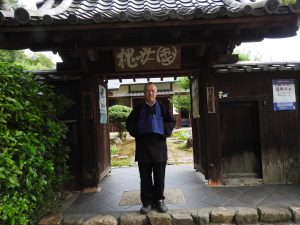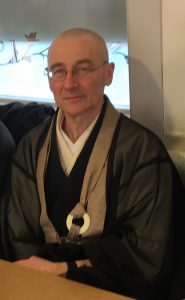I am now here at Fukojo-ji Temple for the month of June. It is mid summer so the weather is beginning to be very hot and muggy on some days and rainy on others. One thing about the weather in Japan though is that it is variable and it is rarely the same two days in a row.
The resident priest and provisional Abbot here is Jirai Reinhardt Mehl. He always has several work projects that he wants to accomplish during my stay. We work in the mornings but in the afternoons I am usually free to pursue other interests. Jirai is gone three days out of the week working at an International Zen Training center in Fukuyama. The International center is run by a private foundation. The mission of the foundation is to provide a place to allow professional people and others to experience the life of Rinzai Zen for a limited time. It is a place where self discipline may be practiced. This foundation has purchased several old Temple buildings from monasteries and rebuilt them at their site near Hiroshima. Sometimes companies send employees to the International training center so that they may learn mindfulness and self motivation.
During the days when Jirai is gone my job is to caretake Fukujo-ji. My duties consist of opening the gate in the early morning and closing the gate in the evenings. Additionally, In the summer I have to open the shoji screens in the mornings and close them in the evening. I am also responsible for carrying on the tradition of doing Zazen followed by reading of the sutras in the mornings. I enjoy this time by myself and I never feel alone because I am always accompanied by the generations of Sangha that has gone before me. Sometimes the feeling is overwhelming that I have been entrusted with the solemn responsibility of care taking this beautiful home of the Buddha Dharma.
A typical day here at the temple begins with Zazen at 5 AM which goes until 6:30 AM. After Zazen there is Choka (service). We chant the Lotus Sutra, the Heart Sutra, the Dia Shin Dhrani and the Buchinson Dhrani along with several smaller verses and echoes. The chanting takes about a half an hour and it is done very fast so I find it impossible to keep up with the tempo. Once I loose my place it is sometimes difficult to find it again. I find that I am always glad when the chanting is done.
After the choka (service) is done we then prepare breakfast which always consists of Okaiyo. This traditional rice porridge is very light on the stomach but at the same time quite filling. One of the most useful things I have learned so far it how to prepare traditional Okaiyo.

